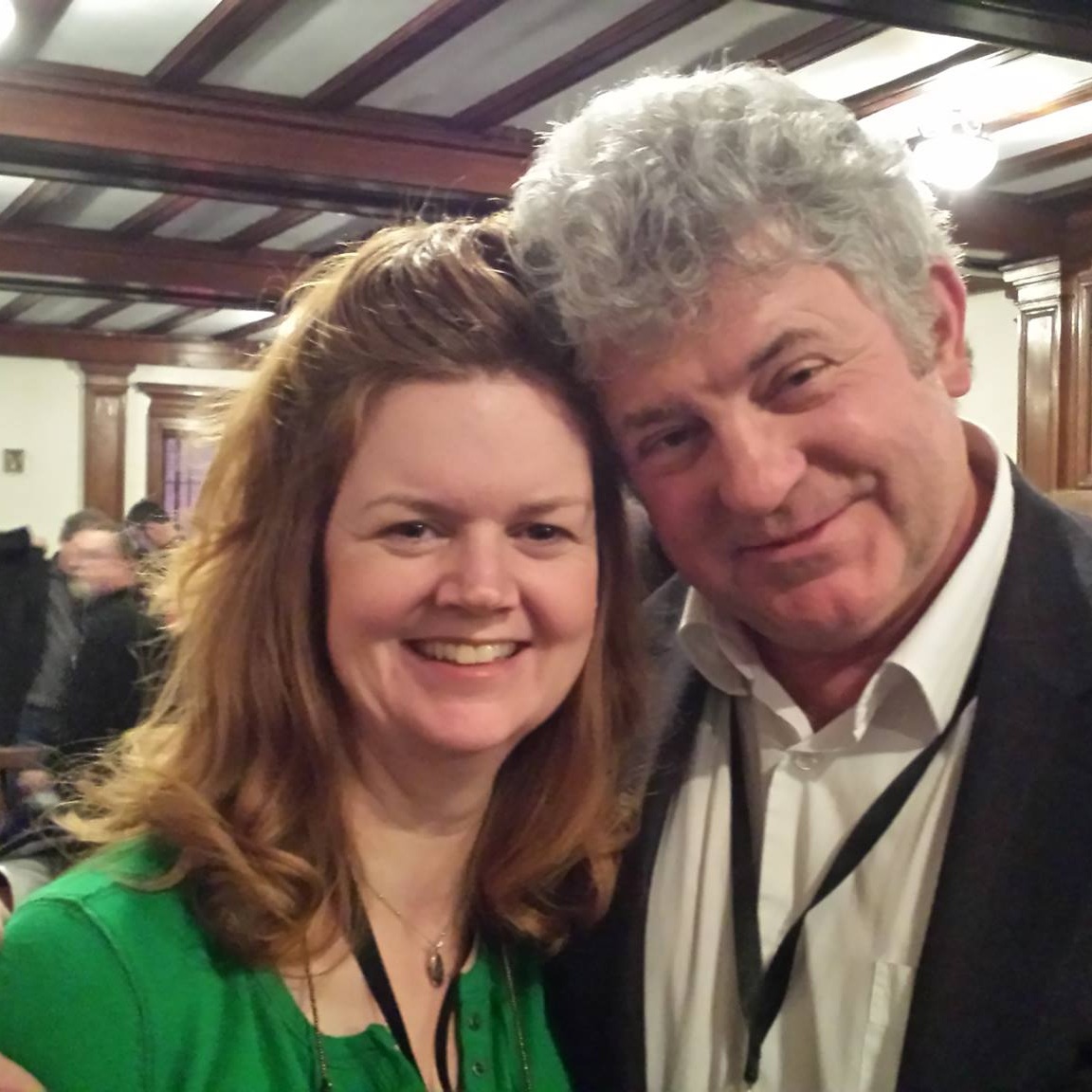I’m so very excited about today’s installment of Q&A August, because it means I get to formally introduce you to Kate Pitt, my pocket dramaturg and Shakespearean soulmate! I first met Kate when she saved my life by letting me crash on the couch in her hotel room before the closing banquet of the 2016 Shakespeare Theatre Association conference. It was my first conference and, by the last day, I was so sleep deprived that I could hardly function. Despite meeting me in such a ragged and incoherent condition, Kate, who was then working in Public Programs at the Folger Shakespeare Library, decided to invite me to the Folger for a public interview/talk event.
You can read up on my visit to the Folger here: Part 1, Part 2, Part 3, Part 4. But, long story short, in Kate I found an absolutely kindred spirit. Within half an hour we were completing each others’ sentences, most because we were conversing almost entirely in Shakespeare quotes. Since then we have gone on several Shakespeare adventures together, including a long-overdue joint pilgrimage to Stratford-upon-Avon earlier this year. Despite having spent extended periods of time in close proximity, we have remained friends, which is something of a minor miracle.
Apart from being a delightful human being, Kate is also a genuine Shakespearean powerhouse, with a vast amount of both scholarly and practical Shakespeare knowledge and experience. You might have noticed that many of my recent comics have included the note “Thanks to my pocket dramaturg, Kate Pitt, for consulting with me on this comic.” This is because I quickly fell into the habit of texting Kate with random Shakespeare-related questions, like “IN HOW MANY SHAKESPEARE PLAYS DO SHEEP REGULARLY APPEAR ON STAGE?” Kate, in her infinite patience and bottomless depth of knowledge, would always promptly text me back with answers, including sources. It was like having my own personal dramaturg in my pocket.
Since then I have often brainstormed comic ideas with her, run drafts past for her approval, and asked for her help when wrestling with particularly troublesome punchlines. (Among other things, she helped me finalize the list of questions I’ve been asking everybody this month!) Creating Good Tickle Brain is a very solitary occupation, and for most of the past five and a half years I’ve been essentially operating in a vacuum. It’s been fun, but it’s also been lonely and isolating at times. Being able to bounce ideas off of Kate, and occasionally commiserate with her on the challenges of being self-employed businesswomen in the Shakespeare world, has made both my job and my life immeasurably more enjoyable.
And so, it gives me GREAT pleasure to turn things over to my pocket dramatrug!
1. Who are you? Why Shakespeare?
I’m Kate Pitt. I’m a dramaturg, writer, producer, and director. I grew up watching Shakespeare films with my parents and saw an outdoor Midsummer at the Edith Wharton house in Lenox when I was about seven. The Mechanicals drove up in a real Jeep, the fairies crept out of the actual woods (I was a city kid – trees were a big deal!), and I was hooked. I’ve also had many wonderful teachers.
2. What moment(s) in Shakespeare always make you laugh?
Orlando forlornly waving his arm and saying “It is my arm”? I’M THERE. A really good (bad) Viola-Sir Andrew fight? SIGN ME UP. Benedict being terrible at hiding? THE BEST. Pyramus’ never-ending death? I LOVE IT. The physical comedy in the plays always makes me laugh. There are lines of text that I almost always laugh at, but I’ve been more delighted when those bits are reinterpreted in ways that sacrifice the laugh, but gain something more interesting in its place. Olivia’s wide-eyed “most wonderful!” is a war-horse, but I once heard it delivered with quiet awe rather than schtick and it was shockingly beautiful. “The dead can live again” rather than “another one!”
Mya interjects: Ok, yes, I also love “It is my arm.”
3. What's a favorite Shakespearean performance anecdote?
A Winter’s Tale where the bear was a puppet, and entered down the aisle sniffing at the audience as it slowly stalked Antigonus. The bear nosed at the handbag of an old lady in the front row and growled at her. She growled right back.
Mya interjects: Don’t mess with old ladies’ handbags.
4. What's one of the more unusual Shakespearean interpretations you've either seen or would like to see?
The opening speech of Richard III done as Bunraku puppet theater, but with a person as the puppet. It showed the pain of being “unfinished” so beautifully while also being horrifying and incredibly funny. This Richard was so close to being a person (“a real boy!”) but knew that he lacked some essential, animating humanity and made a conscious decision to hurt people because of it.
5. What's one of your favorite Shakespearean "hidden gems"?
I love watching the characters on the sidelines – the ones who aren’t the center of attention but are telling incredibly rich stories with their silence. Margaret in Much Ado is a great example and I always watch her when the Prince explains why he thinks Hero is disloyal. Margaret knows in that moment that the ruined wedding is her fault but she says and does…nothing. Aufidius and Isabella also have whole histories in stillness.
6. What passages from Shakespeare have stayed with you?
I’ve had Henry V’s “upon the king” and the Scrivener from Richard III on my mind – the responsibility of leadership and the realization of its corruption – but my favorites are the ones I think as my own thoughts and it takes a minute to figure out where they came from. i.e. on a hiking trip in the pouring rain, carrying a heavy pack, and staring up at switchback #492, I thought, “Blow, wind! come, wrack! At least we'll die with harness on our back!” It took until the top of the mountain to figure that one out.
Mya interjects: If you’re not familiar with the Scrivener from Richard III (and there’s no reason why you should be, since his scene is almost always cut), his one speech goes as follows:
SCRIVENER
Here is the indictment of the good Lord Hastings,
Which in a set hand fairly is engrossed,
That it may be today read o’er in Paul’s.
And mark how well the sequel hangs together:
Eleven hours I have spent to write it over,
For yesternight by Catesby was it sent me;
The precedent was full as long a-doing,
And yet within these five hours Hastings lived,
Untainted, unexamined, free, at liberty.
Here’s a good world the while! Who is so gross
That cannot see this palpable device?
Yet who so bold but says he sees it not?
Bad is the world, and all will come to naught
When such ill dealing must be seen in thought.
I’ve never gotten over the beauty of this line from Pericles – silence may be the perfectest herald of joy, but if you must use words, these ones are pretty great:
“Give me a gash, put me to present pain, lest this great sea of joys rushing upon me o’erbear the shores of my mortality and drown me with their sweetness.”
7. What Shakespeare plays have changed for you?
All of the plays have changed as I’ve gotten older, but the ones that deal with grief have altered the most. A friend died suddenly when we were eighteen and I reached out for Cleopatra and Constance without consciously knowing why. My father died five years later, and by then I knew that I would find some kind of recognition in the plays and I deliberately went to them. The words were always beautiful, but now I knew what they meant. I must have heard Claudius’ “that father lost, lost his” speech a hundred times but never understood the obscenity of telling someone “the right way” to grieve until someone did it to me. Cordelia comforting the confused and frightened Lear sits close to my heart now, and Ophelia’s madness has method in’t. Hamlet’s “mirror up to nature” didn’t tell me what I’d see or how to respond, but it allowed me look at myself and observe both the shadow of my sorrow and the thing itself when I needed it most.
8. What Shakespearean character or characters do you identify the most with?
Beatrice. I love her wit, her walls and her willingness to climb over them, her delight in her friends’ happiness and her white-hot fury at their pain.
Mya interjects: Can confirm, Kate is totally Beatrice.
9. Where can we find out more about you? Are there any projects/events you would like us to check out?
You can follow me on Twitter @katepitt and keep up with me on my website www.katepitt.com.
(Back to Mya) Thanks so much to Kate not only for answering the questions she helped me come up with, but also for being an unfailingly helpful creative and emotional outlet. Get thee a Kate.
COMING NEXT WEEK: A wonderful woman who is training small children to become the next generation of Shakespeare geeks, and two Shakespeare geeks who regularly act like small children!














